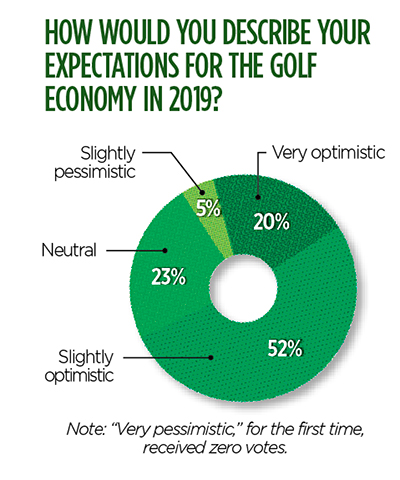The grass is still greener

(Photo: iStock.com/MichaelSvoboda)
There are reasons to be down on the game of golf. Labor challenges, unusually wet or dry weather patterns, aging golfers, rising expenses — they can all keep a superintendent up at night.
And yet, expectations are high for 2019, with 72 percent of readers who took our fall 2018 survey reporting they are either very optimistic (20 percent) or optimistic (52 percent). Additionally, only 8 percent of respondents expect to see their maintenance budgets cut in 2019, while 39 percent expect an increase and 53 percent believe their budgets will remain flat.
Along with surveying our readers, we also reached out to several industry pundits to get their expert opinions on the upcoming year. Our conversations about 2019 included Golf Course Superintendents Association of America CEO Rhett Evans; National Golf Course Owners Association of America CEO Jay Karen; ClubCorp CEO David Pillsbury; Southeast Agronomist for Golf Maintenance Solutions (and former GCSAA President) David S. Downing II; and Aquatrols CEO Matt Foster.
All of those contacted were optimistic for 2019, and for various reasons.

Graph: Golfdom Staff
David S. Downing II
Golf Management Solutions Southeast Agronomist
Former GCSAA President (2008-2009) David S. Downing II has had a diverse career in golf maintenance. From hosting 11 televised events to growing in — and opening — four courses on the same day, Downing has seen most everything in the golf business. He now works to share what he has learned as the Southeast Agronomist for Golf Maintenance Solutions, a company created by superintendents that advises clubs on agronomics, irrigation, construction, capital improvements and due diligence.
Based on what he has seen over the last couple seasons, Downing casts his vote in the “optimistic” category.
“We’ve been excited about all the renovation work that’s going on. It tells us that the cash situations are getting better,” Downing says.
A couple of downers Downing notes are that golf rounds are flat, and many courses are still struggling. But he believes the latter can be fixed when courses start operating more “precisely.”
“From my perspective, there are still a lot of poorly run businesses,” Downing says. “They’re not managing all their resources as accurately or precisely as they could be, so they’re not getting the best buys. There’s a lot of, ‘This is what I’ve always done, this is what I’ve always used, and it works.’”
The cost of maintaining a golf course has “exploded” over the last 15 years, Downing says. As more courses do their homework and better analyze their productivity, they’re seeing more success.
“There isn’t a lot of business help out there,” Downing says. “How can we balance productivity and get more production from a labor force that is becoming harder to find? It’s just a challenge, it comes down to people need to make better decisions.”
Rhett Evans
GCSAA CEO
In late 2018, the staff at GCSAA celebrated a milestone. That’s just one reason why Rhett Evans, CEO of GCSAA, was feeling good about 2019.
“The indicator I look at is our membership numbers, and today we are over our goal of 18,000 members,” Evans says. “Interest in the association is high. We’re seeing a lot of interest in our equipment manager class, in our students. Seeing this activity bodes well for our future.”
Evans anticipates 2019 to be a busy year for the team at GCSAA headquarters.
“I would check ‘optimistic’ (in the survey) and for a couple reasons … through my lens, our key initiatives — the Environmental Institute for Golf, government affairs, professional development — we’ve got some great initiatives that will be at full-tilt in 2019.”
Evans is bullish on the association’s Best Management Practices (BMP) initiative, with its goal of having individual BMP manuals for all 50 states completed by 2020. The BMP manuals will provide the general public with a document describing how each state’s golf courses are being proactive in properly using inputs to maintain conditions.
“We’ve got 20 states that are ‘all systems go’ for 2019,” Evans says. “That’s a major win for the industry, to have these documents in place. It leads us to being able to effectively lobby for golf.”
Jay Karen
NGCOA CEO
Jay Karen, CEO of NGCOA, chose “optimistic” for the Golfdom survey. It’s because he believes courses are pursuing new and different revenue streams to make their facilities profitable.
“More courses are stepping out on the limb and investing into new technologies,” Karen says. “Maybe it’s Toptracer out on the driving range, making the range more of a golf simulator and entertainment venue. Courses are building their business and making it better to make a profit. They’re getting smarter.”
Karen advises that all golf courses look beyond how many golfers play the course and instead consider the different ways a course can pull in customers.
“You have to diversify the business and update the customer experience,” Karen says. “Try different areas as entertainment zones … build bays on the driving range. We’re observing the Topgolf phenomenon closely — it’s the darling of the industry. But what can we learn (from Topgolf) at 14,000 golf courses? It’s that we need to add fun and entertainment.”
An advantage Topgolf has over the common golf course is that it’s weatherproof, Karen says. When the weather gets bad, courses lose inventory, and there is nothing the facility can do about it.
Or can it?
“The golf course of the future will be indoor and outdoor, both under the sun and under the moon,” Karen says. “The operators will get there, but this is just the tip of the spear. The question is how does the operator get there?”
David Pillsbury
ClubCorp CEO
ClubCorp owns and operates more than 200 private golf and country clubs. ClubCorp CEO David Pillsbury selects “very positive” as how he views the golf economy in 2019, with two caveats.
“One, the broader economic environment has been very good,” he says, “but there’s no telling what 2019 brings, and two, 2019 will be an El Niño year, and it’s hard to say how that will influence golf in 2019. But I’m very optimistic about golf. There is no problem with the demand for golf. The challenge we have is converting people interested in the sport into actual golfers.”
Pillsbury notes the PGA of America is making tremendous strides in connecting interested people with the game. He adds that data he has seen tells him that half of all nongolfers who played Topgolf are interested in learning more about playing the game on a green-grass golf course. (The company announced in December that it had purchased the controlling interest in BigShot Golf, a golf simulator game similar to Topgolf.) While his core business revolves around golf and country clubs and city clubs, he finds himself spending more time watching how the technology around the game is influencing today’s golfer and nongolfer.
Something Pillsbury says he thinks is improving in the game is resolving what he calls a “friction” problem.
“We need to remove that friction out of the experience for the people who want to dip their toe into the water,” Pillsbury says. “It’s like when you walk into a bar and everyone turns and looks at you and it suddenly gets quiet. What are you going to do? You’re going to walk right back out. It’s a visual demonstration of what happens too often (in golf.) You have to create a warm welcome, magical moments and a fond farewell.”
Matthew Foster
Aquatrols CEO
“When you’re in the water management business, you look forward to not having one of the wettest years ever in the east,” laughs Matt Foster, CEO of Aquatrols. With the 2018 weather behind him, he’s “optimistic” for 2019.
Every course can’t be a top 10 course, Foster says, but every course can understand the wants of its local golf market.
“As a lifelong golfer, a former superintendent and a businessman, when I look at the dynamics of the golf industry — it’s not that unique,” Foster says. “No one wants to play golf again as much as the person who just shot their handicap, as opposed to the golfer who just got his teeth kicked in for five hours. The courses that understand the value proposition for a round of golf will have as much golf as they need. Demand creation won’t come from acronym-based organizations or Tee it Forward, that’s too simple. You have to rely on repeat play and excellent course conditions, and that one is where Aquatrols wants to be in the conversation.”
Foster admits he’s biased toward the game. He says he’ll always bet on golf because of its importance to families and communities.
“(But) I think today’s golfer cares for their time more than their dollar,” Foster says. “If they have a good time, they’ll be back.”









